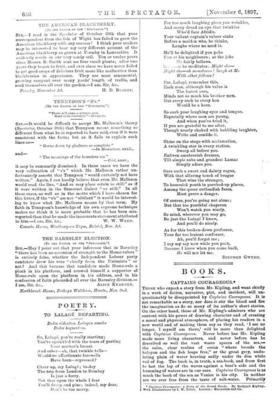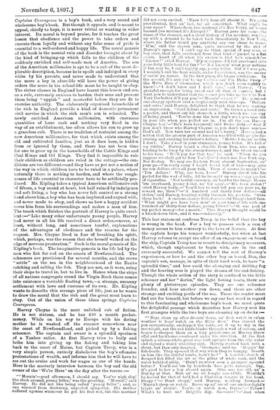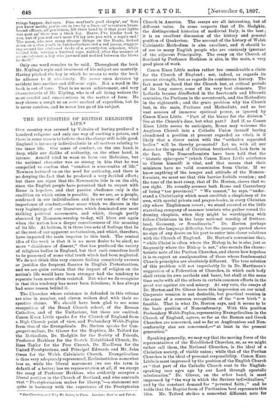BOOKS.
CAPTAINS COURAGEOUS.*
THOSE who expect a story from Mr. Kipling, and want chiefly in a work of fiction, narrative, plot, and incident, will un- questionably be disappointed by Captains Courageous. It is not remarkable as a story, nor does it stir the blood and fire the imagination as do so many of its author's short stories. On the other hand, those of Mr. Kipling's admirers who are content with his power of drawing character and of creating a moral and physical atmosphere, of placing his readers in a new world and of making them say as they read, • I see no longer, I myself am there,' will be more than delighted with Captains Courageous. Never before has Mr. Kipling made more living characters, and never before has he described so well the vast waste spaces of the sea?... the calm, clear realms of ocean "where broods the halcyon and the fish leaps free," or the great grey, undu- lating plain of water heaving sadly under its dim white veil of fog. The book is, in truth, a sea-book, and from first to last the lap of the waves against a boat's side and the humming of waters are in our ears. Captains Courageous is as much the book of the sea as Venice is his city. In neither are we ever free from the taste of salt-water. Primarily • Captains Courageous a Story of the Grand Banks. By Rudyard Kipling. With Illustrations by L W. Taber. London : Macmillan and Co. Captains Courageous is a boy's book, and a very sound and wholesome boy's boo15. But though it appeals, and is meant to
appeal, chiefly to boys, it is never trivial or wanting in wider interest. Its moral is beyond praise, for it teaches the great lesson that obedience and the power to take orders and execute them loyally and without any false sense of pride is essential to a well-ordered and happy life. The moral genesis of the book is the mental ruin and disorder brought about by the kind of bringing-up which falls to the children of the suddenly enriched and self-made men of America. The son of the American millionaire is apt to be a cub of the most de- plorable description, because he is spoilt and indulged in every whim by his parents, and never made to understand that the more a boy in after-life will have the power of giving orders the more in his school-life must he be taught to obey. The richer classes in England have learnt this lesson and are, as a rule, extremely anxious to harden their sons and prevent them being " uppish " and masterful before they are fit to exercise authority. The elaborately organised households of the rich in England provide a kind of domestic permanent civil service in which the rich man's son is schooled. The newly enriched American millionaire, with enormous quantities of loose cash and nothing very fixed in the way of an establishment, too often allows his son to grow up a graceless cub. There is no tradition of restraint among the new American millionaires, for that which exists among the old and cultivated families, just as it does here, is hidden from or ignored by them, and there has not been time for one to grow up in the households of the Cattle Kings and Coal Kings and Oil Kings. They find it impossible to rule their children as children are ruled in the cottage—the con- ditions are too different—and they have as yet not a notion of the way in which children have to be ruled in a palace, where
naturally there is nothing to harden, and where the rough- nesses of life essential to character have to be artificially pro- duced. Mr. Kipling takes a typical American millionaire cub of fifteen, a boy sound at heart, but half ruined by indulgence and soft living, a boy who has never felt control or a strong band above him, a boy who has been implored and argued with,
and never made to obey, and shows us how a happy accident request. Mrs. Cheyne lived in fear of breaking his spirit, which, perhaps, was the reason that she herself walked on the edge of nervous prostration." Such is the moral genesis of Mr.
Kipling's book. The imaginative genesis is the life led by the men who fish for cod on the coasts of Newfoundland. The schooners are provisioned for several months, and the crews " settle" on the sea in the neighbourhood of the Banks catching and salting the fish. They are not, as it were, using their ships to travel in, but to live in. Hence when the ships of all nations congregate round the Virgin Rock there comes
into existence a veritable floating town,—a strange, uncanny settlement with laws and customs of its own. Mr. Kipling wants to describe this strange piece of life, just as he wants to draw the moral that the rich and the great must learn to obey. Out of the union of these ideas springs Captains
Courageous.
Harvey Cheyne is the most unlicked cub of fiction. He is not sixteen, and he has 240 a month pocket. money. While on his way to Europe with his doting mother he is washed off the steamer somewhere near
the coast of Newfoundland, and picked up by a fishing schooner. The captain and owner is a splendid specimen of a Yankee sailor. At first Harvey tries to bully and bribe him into giving up the fishing and taking him back to the coast of Maine, but Captain Troop, who is a very simple person, entirely disbelieves the boy's offensive protestations of wealth, and informs him that he will have to see out the cruise and work for wages as one of the hands.
Here is the masterly interview between the boy and the old owner of the We're Here' on the day after the rescue :—
"' Mornin'—good afternoon, I should say. You've nigh slep' the clock around, young feller,' was the greeting. said Harvey. He did not like being called 'young feller '; and, as one rescued from drowning, expected sympathy. His mother suffered agonies whenever he got his feet wet, but this mariner did not seem excited. • Naow let's hear all abaout it. It's quite providential, first an' last. for all concerned. What might be your name ? Where from (we mistrust it's Noo York), an' where baound (we mistrust it's Europe) ? ' Harvey gave his name. the name of the steamer, and a short history of the accident, windia4 up with a demand to be taken back immediately to New York, where his father would pay anything any one chose to name. li'm,' said the shaven man, quite unmoved by the end of Harvey's speech. I can't say we think special of any man, or boy even. that falls overboard from that kind o' packet in a fiat ca'am. Least of all when his excuse is thet he's sea-sick.'- ' Excuse !' cried Harvey. D'you suppost: I'd fall overboard into your dirty little boat for fun ?'—' Not kuowin' what your notions o' fun may be, I can't rightly say, young feller. But if I was you, I wouldn't call the boat which, under Providence, was the means o' saviu' ye, names. In the first place, it's blame irreligious. In the second, it's annoyin' to my fttelin's—an' I'm Disko Troop o' the We're Here o' Gloucester, which you don't seem rightly to know.'—' I don't know and I don't care,' said Harvey. ' I'm grateful enough for being saved and all that of course ; but I want you to understand that the sooner you take me battk to New York the better it'll pay you.'—' Jleanin'—haow ?"fro,tp raised one shaggy eyebrow over a suspiciously mild blue eye. • Dollars and cents,' said Harvey, delighted to think that he was waking an impression. Cold dollars and cents.' Be thrust a hand into a pocket, and threw out his stomach a little, which was his way of being grand. 'You've done the best day's woi k you ever did in your life when you pulled me in. I'm all the son Harvey Cheyne has.'—'lle's been favoured,' said Disko drily.—' And if you don't know who Harvey Cheyne is, you don't know much— that's all. Now turn her around and let's hurry.' llarvey had a notion that the greater part of America was filled with people dis- cussing and envying his father's dollars. Mena I do, an' inehbe I don't. Take a reef in your stummick, young feller. It's full o' my vittles.' Harvey heard a chuckle from Dan, who was pre- tending to be busy by the stump-foremast, and the blood rushed to his face. 'We'll pay for that too,' he said. • When do you suppose we shall get to New Yor'.:??—' I don't use Non York any. Ner Boston. We may see Eastern Point abaout September, an' your pa—I'm really sorry I hain't heerd tell of him—may give me ten dollars efter all your talk. Then o' course he mayn't!— ' Ten dollars ! Why, see here, I—' Harvey dived into his pocket for the wad of bills. All he brought up was a sog.t.fy packet of cigarettes. 'Not lawful currency, an' bad for the lungs. Heave 'ern overboard, young feller, an' try agile.—' It's been stolen !' cried Harvey hotly.—' You'll hey to wait till you see your pa, to reward me, then ? '—` A hundred and thirty four dollars—all stolen,' said Harvey, hunting wildly through his pockets. • Give them back.' A curious change flitted across old Troop's hard face. What might you have been (loin' at your time o' life with one hundred an' thirty-four dollars, young feller It was part of my pocket money—for a month.' Phis Harvey thought would be a knock-down blow, and it was—indirectly."
This last statement confirms Troop in the belief that the boy is wrong in the head. For a boy to possess such a sum of money seems to him contrary to the laws of Nature. At first the captain keeps his temper wonderfully, but when at last Harvey refuses to accept the offer of an engagement on board the ship, Captain Troop has to resort to disciplinary measures, which, though unpleasant to begin with, are in the end extremely successful. We cannot tell the rest of Harvey's experiences, or how he and the other boy on board, Dan, the captain's son, manage, in spite of their hard work, to have "a splendid time," and how amid the changing and drifting fog and the heaving seas is played the drama of the cod-fishing. Though the whole action of the story is confined to the little schooner and her "dories," the light fishing boats, there are plenty of picturesque episodes. They see one schooner founder, and hear another run down, and there are other strange and exciting perils of the sea. These the reader must find out for himself, but before we say our last word in regard to this fascinating and wholesome boy's book we must quote the delightful passage which describes how Harvey sees his first grampus while the two boys are cleaning up on decks "' Boys clean up after dressin' down, an' first watch in ca'am weather is boys' watch on tho We're Here.' Dan sluiced the pen energetically, unshipped the table, set it up to dry in the moonlight, ran the red knife-blades through a wad of oakum, and began to sharpen them on a tiny grindstone. as Harvey threw offal and backbones overboard under his direction. At the first splash a silvery-white ghost rose bolt upright from the oily water and sighed a weird whistling sigh. Harvey started back with a shout, but Dan only laughed. Grampus,' said he. Beggin' fer fish-heads. They up-eend that way when they're hungry. Breath on him like the doleful tombs, hain't he ? ' A. horrible stench of decayed fish filled the air as the pillar of white sank, and the water bubbled oilily. Hain't ye never seen a grampus up-eend. before ? You'll see 'em by hundreds 'fore ye're through. Say, it's good to her a boy aboard again. Otto was too old, an' a Dutchy at that. Him an' me we fought consid'ble. Wouldn't ha keered fer thet ef he'd bed a Christian tongue in his head. Sleepy ? '—• Dead sleepy,' said Harvey, nodding forward.— ' Mustn't sleep on watch. Rouse up an' see et our anchor-light's bright an' shinin'. You're on watch now, Ilarve.'—' Pshaw I What's to hurt us? Bright's day. Sn—orrr ! '—' Jest when things happen, dad says. Fine weather's good sleepin', an' fore you know mebbe you're cut in two by a liner, an' seventeen brass- bound officers, all gen'elmen, lift their hand to it that your lights was aout an' there was a thick fog. Harve, I've kinder took to you, but ef you nod onct more I'll lay into you with a rope's end.' The moon, who sees many strange things on the Banks, looked down on a slim youth in knickerbockers and a red jersey, stagger- ing around the cluttered decks of a seventy-ton schooner, while behind him, waving a knotted rope, walked, after the manner of an executioner, a boy who yawned and nodded between the blows he dealt."
Only one word remains to be said. Throughout the book Mr. Kipling's style and treatment of his subject are masterly. Having pitched the key in which he means to write the book he adheres to it absolutely. He never once deviates by accident into another and different style. Not a word in the book is out of tone. That is no mean achievement, and very characteristic of Mr. Kipling, who is of all living writers the most careful and conscientious in the matter of form. He may choose a rough or an outr6 method of exposition, but he is never careless, and he never lets go of his subject.
























































 Previous page
Previous page